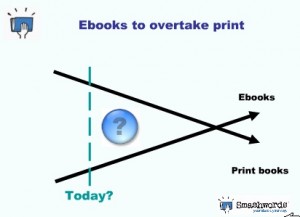I enjoyed a fascinating and informative day at the NZ Society of Authors seminar, Publishing for Authors — the whole picture yesterday.
One of the keynote speakers was Mark Coker of Smashwords who talked about the past and preset of e-books, trends in the market, and the mistakes he sees US publishers making that perhaps we can learn to avoid. It was a really worthwhile session (see his slideshow below the fold).
I learned a lot from this likeable man whose business, which acts as a marketing/distribution platform for self-published and professionally published e-books, has experienced phenomenal growth as part of the wave. He told us Smashwords listed 140 e-books at the end of 2008, 6,000 e-books by end of 2009, and 22,500 by Sept this year 2010.
Mark’s analysis of the drivers of the traditional publishing model (mainly: control and, lately, risk mitigation) and the playing field-equalising effect of software and our move (headlong sprint?) to the internet really rang true. The money ‘equation’ and the prospect of added control means that more and more authors are becoming publishers, and more professional authors will go independent (becoming ‘indie’ publishers like indie filmmakers).
Publishers are losing control of the bricks and mortar, he said, which will, with the rise of e-books and print-on-demand solutions, become increasing irrelevant. Reading is unquestionably, demonstrably moving to screens.
One of the widely acknowledged downsides of that power-to-author move is a very real risk to ‘quality‘ — editorial and design — and Mark emphasised the ‘responsibility’ of the author/publisher to write a GREAT book — ‘Honour your reader with a great book’, he said. ‘Be fanatical about quality.’ He shared a few horror stories of badly-edited and presented books uploaded to Smashwords. Always gonna happen.
There was much more in his presentation, all of it valuable, including some quite out-there thoughts about Digital Rights Management.
I, along with a minority of book people, think DRM is counterproductive to the future of book publishing. We shouldn’t erect obstacles that prevent customers from enjoying books. DRM treats law abiding customers like criminals by limiting their ability to enjoy their book their way. DRM adds unnecessary complexity and expense to books.
Hmm, the jury is still out on that one.
Here’s his recent The Seven Secrets to e-Book Publishing Success posted at Huffington Post which formed part of his talk, and the slideshow, if you’re interested.
Last thing: I liked this comment from his Smashwords Style Guide:
What Smashwords Publishes, What We Don’t Publish
Smashwords publishes only original and legal works, direct from the author or the exclusive digital publisher. We do not publish public domain books unless you are the original author. We also don’t publish incomplete or partial books, or books that appear elsewhere on the Internet under other authors’ names, as is common with Private Label Rights scams. If you write erotica, all your characters should be adults. And finally, we strongly discourage any book that advocates get-rich-quick “systems” for making money on the Internet. Smashwords is a serious publishing service for serious writers only.



Thanks for the great summary of my presentation. Thanks also for attending!
mark
Cheers Mark.
It was a good day and I appreciated your insights.
I’ve been percolating about view of DRM — i.e. avoid it. Is it true Amazon insists on ‘infecting’ (to use your phrase) Kindle e-book files? Even from those Smashwords? -P
I’ve played around with an ebook (the Kindle) and I didn’t like it much because you can’t brighten the screen. Apparently, it’s designed this way; the brightness is supposed to mimic a real book. I recently played around with an iPad and I have to admit that it was pretty sharp. A real computer with internet, TV, Movies, and books; the screen is larger than the Kindle and other ebooks and also, most important to me, you can adjust the screen brightness.
I don’t think paper books will ever be supplanted by electronic books. There is something reassuring and comforting about a real book. There’s a reason people store them and stack them – lining their walls with them. They are more than ornamental – they become part of us. We, the reader, latch onto the stories contained within, never wanting to part with them. Books are a reflection of self and the books we choose to surround ourselves with tell others about us. In their electronic form a book is, well, impersonal – it speaks to no one but itself. And what are you supposed to do with them when done?
[…] a nice followup to my earlier post about e-books changing the publishing/bookselling industry, and notes from Mark […]